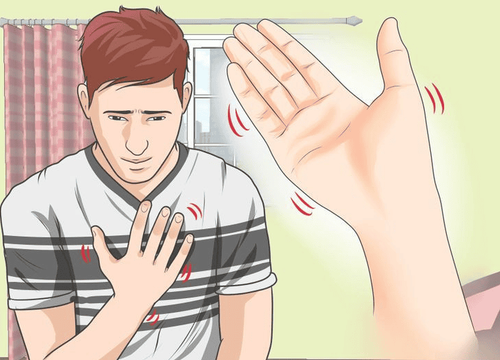This is an automatically translated article.
Tardive dyskinesia is dyskinesia, dyskinesia, dystonia, and myoclonic tremor. Drug-induced tardive dyskinesia occurs during or after drug discontinuation. Drugs that can cause tardive dyskinesia such as antipsychotics, antiemetics.1.What is tardive dyskinesia? Tardive dyskinesia is the most common side effect in people treated with antipsychotics. This condition is common in women, the elderly and people with manifestations of cognitive disorders, mood disorders. Predisposing factors for the onset of the disease include advanced age, brain damage, and previous electrotherapy.
Tardive dyskinesia may occur in 10 to 20% of patients taking antipsychotics for a minimum of 3 months to 1 year; or 1 month for patients over 60 years of age. The longer the medication is taken, the higher the risk.
Drug-induced tardive dyskinesia lasts at least 1 month, usually 3 to 6 months. This movement disorder usually occurs when the antipsychotic drug is suddenly stopped after taking the drug for a long time. Drugs that can cause this disorder include antipsychotics in the treatment of schizophrenia, bipolar disorder; antidepressants (Chlorpromazine, Fluphenazine,...); antiemetics such as prochlorperazine and metoclopramide, calcium channel blockers with dopamine receptor blocking properties such as flunarizine and cinnarizine.
Tardive dyskinesia includes forms such as:
Movement disorders, typically mouth and tongue dyskinesia) Tracheal dyskinesia is a repetitive pattern of movement without purpose, such as shaking of the legs intermittent, restless, walking, dystonia (local, general or segmental) such as myoclonus, muscle stiffness, convulsions, torsion. Late Parkinson's syndrome

Loạn vận động muộn là tác dụng phụ thường gặp nhất ở người được điều trị bằng thuốc chống loạn thần
2.Symptoms of tardive dyskinesia Signs and symptoms of tardive dyskinesia can begin with spasmodic, uncontrollable twitching movements of the face, lips, tongue, jaw, or limbs. These movements include:
Face grimacing, winking, lip smacking, continuous tongue movements Jaw swinging, repeated chewing Cheek puffs Frowning Finger movements, finger wiggling, clapping Fingers Tapping toes Extending hips, sway back and forth
3.Diagnosis of tardive dyskinesia Diagnostic criteria for tardive dyskinesia include:
Appearance of involuntary movements of the head, face, mouth, chin, tongue, trunk, or tips of the toes and arms. for at least a few weeks (4 weeks), due to antipsychotic medication for at least several months (may be shorter in the elderly). In patients with severe tardive dyskinesia, dysphagia may result in dysphagia, dysphagia causing dysphagia, belching, and hiccups. Involuntary movements may include: Choreographies are rapid, non-repetitive jerking movements. The dance moves are slow, continuous bending movements. Shape movements have rhythm. 3. The above symptoms appear while taking antipsychotics or about 4 weeks after stopping the drug.
4. Have taken antipsychotic medication for at least 3 months (1 month if you are over 60).
5. The above symptoms are not caused by neurological disease, medical disease (Huntington chorea, Parkinson's disease, Tourette syndrome, Wilson disease, cerebral palsy, stroke), idiopathic dyskinesia, hyperactivity. hypothyroidism or use of drugs that can cause acute reversible dyskinesia (Bromocriptine, L-Dopa).
6. Symptoms that are not acute dyskinesia caused by antipsychotic drugs (acute dystonia, restlessness,.....)

Việc dùng thuốc chống loạn thần từ 3 tháng trở lên là một trong những tiêu chuẩn chẩn đoán loạn vận động muộn
4.Treatment of tardive dyskinesia Management of tardive dyskinesia usually includes:
Reducing dose or stopping current medication Switching to another antipsychotic or a different combination of drugs. Atypical antipsychotics such as olanzapine, risperidone or quetiapine are options when the patient is unresponsive to treatment. These drugs are effective in tardive dyskinesia, less likely to cause parkinsonism and restlessness. Clonazepam has been shown to be effective for the treatment of myoclonus. Clozapine is used in patients with chronic psychosis, but there is a risk of agranulocytosis and frequent monitoring of the blood count. Antioxidants such as vitamin E, vitamin B6, and Ginkgo biloba may also be effective in treating tardive dyskinesia. Ginkgo biloba has an antiplatelet effect, so special caution should be exercised in patients receiving anticoagulants or antiplatelet agents. Anticholinergics also work to prevent or reduce the severity of drug-induced dyskinesia. Some other drugs help relieve symptoms such as tetrabenazine, amantadine, propranolol. If you need to consult and visit Vinmec Hospitals under the national health system, please book an appointment on the website (www.vinmec.com) for the best service.
Please dial HOTLINE for more information or register for an appointment HERE. Download MyVinmec app to make appointments faster and to manage your bookings easily.













